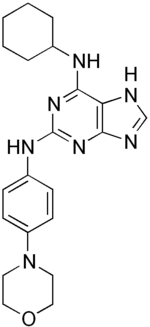Chemistry:Reversine
From HandWiki

| |
| Names | |
|---|---|
| IUPAC name
N′-Cyclohexyl-N-(4-morpholinophenyl)-7H-purine-2,6-diamine
| |
| Identifiers | |
3D model (JSmol)
|
|
| ChEBI | |
| ChemSpider | |
| MeSH | C484369 |
PubChem CID
|
|
| UNII | |
| |
| |
| Properties | |
| C21H27N7O | |
| Molar mass | 393.495 g·mol−1 |
Except where otherwise noted, data are given for materials in their standard state (at 25 °C [77 °F], 100 kPa). | |
| Infobox references | |
Tracking categories (test):
Reversine, or 2-(4-morpholinoanilino)-6-cyclohexylaminopurine, is a small molecule developed by the group of Peter G. Schultz, used for stem cell dedifferentiation.[1][2]
It also has the potential to selectively induce cell death in cancer cells.[3]
Reversine is known to act as an antagonist of the adenosine A3 receptor. Reversine is a potent inhibitor of the mitotic kinase Mps1[4] and it is widely used to study the process of chromosome segregation.
References
- ↑ Chen, Shuibing; Zhang, Qisheng; Wu, Xu; Schultz, Peter G.; Ding, Sheng (2004). "Dedifferentiation of Lineage-Committed Cells by a Small Molecule". Journal of the American Chemical Society 126 (2): 410–1. doi:10.1021/ja037390k. PMID 14719906.
- ↑ Chen, S.; Takanashi, S.; Zhang, Q.; Xiong, W.; Zhu, S.; Peters, E. C.; Ding, S.; Schultz, P. G. (2007). "Reversine increases the plasticity of lineage-committed mammalian cells". Proceedings of the National Academy of Sciences 104 (25): 10482–7. doi:10.1073/pnas.0704360104. PMID 17566101. Bibcode: 2007PNAS..10410482C.
- ↑ Piccoli, Marco; Palazzolo, Giacomo; Conforti, Erika; Lamorte, Giuseppe; Papini, Nadia; Creo, Pasquale; Fania, Chiara; Scaringi, Raffaella et al. (2012). "The synthetic purine reversine selectively induces cell death of cancer cells". Journal of Cellular Biochemistry 113 (10): 3207–17. doi:10.1002/jcb.24197. PMID 22615034.
- ↑ Santaguida, Stefano; Tighe, Anthony; D'Alise, Anna Morena; Taylor, Stephen S.; Musacchio, Andrea (2010-07-12). "Dissecting the role of MPS1 in chromosome biorientation and the spindle checkpoint through the small molecule inhibitor reversine". The Journal of Cell Biology 190 (1): 73–87. doi:10.1083/jcb.201001036. ISSN 1540-8140. PMID 20624901.
External links
- Henry, Celia (January 5, 2004). "Cellular U-Turn". Chemical and Engineering News 82 (1): 9. doi:10.1021/cen-v082n001.p009. http://cen.acs.org/articles/82/i1/CELLULAR-U-TURN.html.
 |
